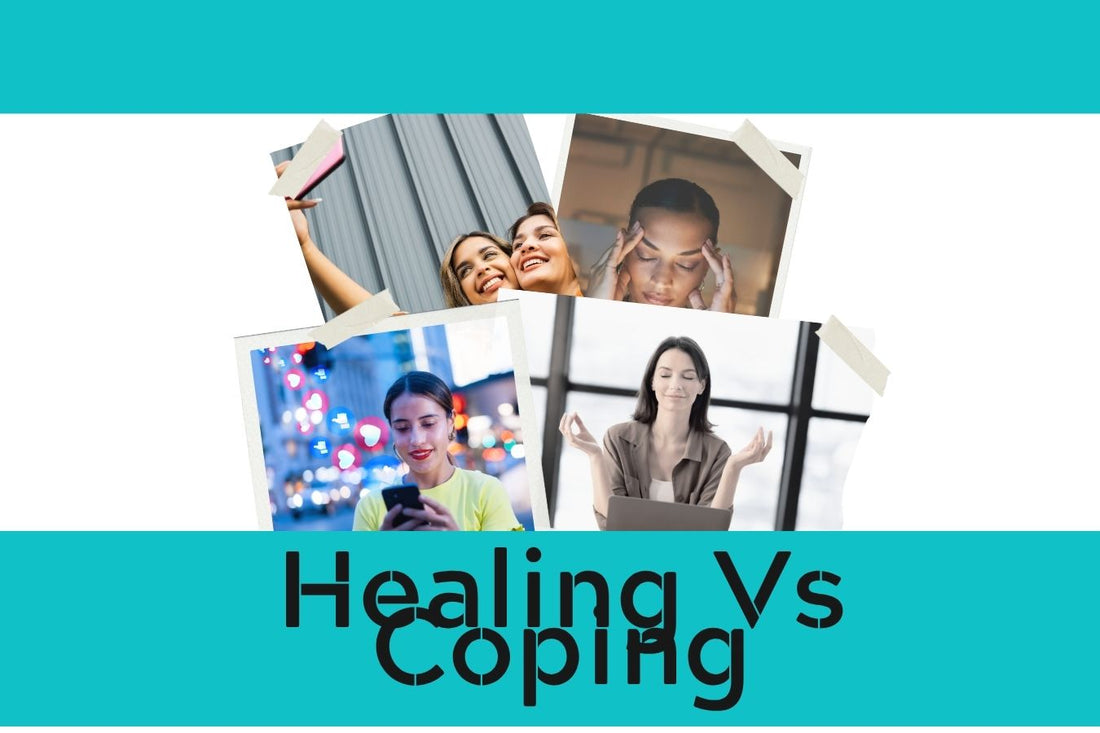
Healing vs. Coping: How Social Media Keeps You in Survival Mode
Share
Social media is like a second home in today's digital world. We check it when we wake up, scroll to unwind, and even use it to process our emotions. It’s connected us in incredible ways, but it’s also brought along some hidden challenges, especially regarding our healing.
In this post, we’re diving into something many of us don’t talk about enough: the difference between healing and coping, and how social media can unintentionally keep us stuck in survival mode, rather than supporting real emotional recovery.
Healing vs. Coping: What’s the Difference?
Let’s break it down.
Healing is deep, intentional, and often uncomfortable. It means sitting with your emotions, becoming curious about where they come from, and being brave enough to face the roots of your pain. It’s not always pretty but it leads to real growth and lasting change.
Coping, on the other hand, is about getting through the moment. It’s our way of dealing with stress, sadness, or discomfort when it all feels too much. Coping isn’t bad — we all need it sometimes — but it becomes a problem when it replaces healing instead of supporting it.
When Social Media Becomes a Coping Crutch
While social media can offer comfort and community, it can also subtly encourage us to avoid the deeper work. Here’s how:
1. Escapism & Endless Distraction
Scrolling through feeds becomes a go-to escape from reality. When emotions rise or life feels hard, it’s tempting to dive into a sea of content instead of facing what’s really going on inside.
2. The Comparison Trap
Everyone’s posting their highlight reel. Their wins, their glow-ups, their “healing journeys.” It’s easy to compare your behind-the-scenes to someone else’s curated story and feel like you’re not doing enough or healing “right.”
3. Craving Validation
Let’s be real, the likes, comments, and shares feel good. But sometimes we end up chasing external validation instead of building self-worth from within. It can keep us focused on appearances rather than authenticity.
4. Quick Fixes Over Deep Work
The dopamine rush from social media is instant, unlike real healing, which takes time and patience. This can make the hard work of inner healing feel too slow or unappealing in comparison.
Why It Matters: The Risk of Staying in Coping Mode
Coping isn’t the enemy, it’s part of how we get by. But if we stay there too long, we risk:
- Avoiding deeper pain that needs attention.
- Missing out on clarity and growth that come from self-reflection.
- Losing patience with the healing process, thinking it should feel as fast or flashy as a viral post.
So, How Can We Use Social Media Without Losing Ourselves?
Social media doesn’t have to be the villain in your healing story. With a little awareness, it can actually become part of your support system.
Here are some ways to find balance:
· Mindful Scrolling. Notice how certain content makes you feel. Set boundaries around your screen time and unfollow accounts that leave you drained or doubting yourself.
· Seek Real Connection. There are amazing spaces online filled with people doing the deep work. Follow creators who speak to your soul, share honestly, and encourage true healing.
· Make Space for Offline Healing. Therapists, support groups, journaling, nature walks, or even just silence — these are the moments where real healing often happens.
· Stay in Your Lane. Everyone’s path looks different. Just because someone’s healing looks perfect online doesn’t mean yours is any less powerful. Trust your pace.
Reflective Questions for Healing:
- When I’m feeling overwhelmed, do I give myself space to feel… or do I reach for something to distract me right away? (What do I usually turn to — comfort or avoidance?)
- Am I trying to “get over it” quickly, or am I giving myself permission to move through it at my own pace? (Am I rushing the process or respecting it?)
- Do I feel a real sense of relief and growth after what I do to feel better… or just temporary comfort? (Is this helping me heal or just helping me cope?)
- Have I taken time to understand the root of my pain, or am I mostly managing the symptoms? (What have I actually explored beneath the surface?)
- Am I seeking validation from others online, or am I learning to validate and care for myself offline? (Who am I really trying to feel seen by?)
The Path Back to Authentic Healing
True healing isn’t found in a scroll. It’s found in stillness, honesty, and presence with yourself. Social media may give you quick comfort, but your real transformation begins the moment you pause, breathe, and turn inward.
Healing isn’t about perfection or performance; it’s about awareness. The more you recognize when you’re coping instead of truly processing, the more power you have to choose differently. To show up for yourself with compassion, patience, and courage.
Remember: you don’t have to rush your healing to make it look beautiful. Growth is quiet, sacred work that happens in your own time. Step away from the noise when you need to, return to your breath, and trust that even small acts of awareness are powerful steps toward freedom.
